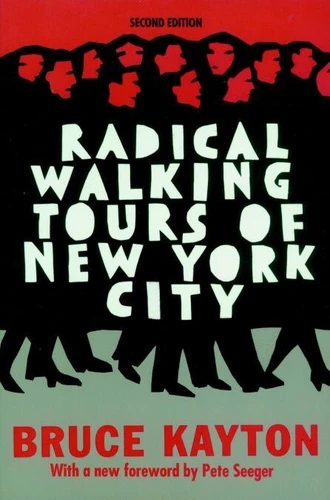Radical Walking Tours of New York City
Par : ,Formats :
Disponible dans votre compte client Decitre ou Furet du Nord dès validation de votre commande. Le format ePub protégé est :
- Compatible avec une lecture sur My Vivlio (smartphone, tablette, ordinateur)
- Compatible avec une lecture sur liseuses Vivlio
- Pour les liseuses autres que Vivlio, vous devez utiliser le logiciel Adobe Digital Edition. Non compatible avec la lecture sur les liseuses Kindle, Remarkable et Sony
- Non compatible avec un achat hors France métropolitaine
 , qui est-ce ?
, qui est-ce ?Notre partenaire de plateforme de lecture numérique où vous retrouverez l'ensemble de vos ebooks gratuitement
Pour en savoir plus sur nos ebooks, consultez notre aide en ligne ici
- Nombre de pages224
- FormatePub
- ISBN978-1-60980-042-0
- EAN9781609800420
- Date de parution04/01/2011
- Protection num.Adobe DRM
- Taille3 Mo
- Infos supplémentairesepub
- ÉditeurSeven Stories Press
Résumé
Traditional walking tours of New York enshrine the wealthy and war heroes by emphasizing what they've left behind. Rarely seen are those buried in their wake-those who fought the power, pushing for a better world. In Radical Walking Tours of New York Bruce Kayton leads us to monuments of those other heroes. Through Kayton's lens, the history of all hitherto existing neighborhoods is the history of class struggles, civil rights battles, and labor movements; these twelve tours provide as many exciting, provocative, and educational afternoons.
You can visit, for instance, Emma Goldman's long-time home in the East Village, Langston Hughes's house in Harlem, the site of Mabel Dodge's salon o the apartment in which John Reed worked on Ten Days That Shook the World, and the site of Margaret Sanger's first birth control clinic. From Battery Park to Harlem, from the Lower East Side to Central Park, Bruce Kayton's tours provide a new perspective on the history of both New York City and American radicalism.
You can visit, for instance, Emma Goldman's long-time home in the East Village, Langston Hughes's house in Harlem, the site of Mabel Dodge's salon o the apartment in which John Reed worked on Ten Days That Shook the World, and the site of Margaret Sanger's first birth control clinic. From Battery Park to Harlem, from the Lower East Side to Central Park, Bruce Kayton's tours provide a new perspective on the history of both New York City and American radicalism.
Traditional walking tours of New York enshrine the wealthy and war heroes by emphasizing what they've left behind. Rarely seen are those buried in their wake-those who fought the power, pushing for a better world. In Radical Walking Tours of New York Bruce Kayton leads us to monuments of those other heroes. Through Kayton's lens, the history of all hitherto existing neighborhoods is the history of class struggles, civil rights battles, and labor movements; these twelve tours provide as many exciting, provocative, and educational afternoons.
You can visit, for instance, Emma Goldman's long-time home in the East Village, Langston Hughes's house in Harlem, the site of Mabel Dodge's salon o the apartment in which John Reed worked on Ten Days That Shook the World, and the site of Margaret Sanger's first birth control clinic. From Battery Park to Harlem, from the Lower East Side to Central Park, Bruce Kayton's tours provide a new perspective on the history of both New York City and American radicalism.
You can visit, for instance, Emma Goldman's long-time home in the East Village, Langston Hughes's house in Harlem, the site of Mabel Dodge's salon o the apartment in which John Reed worked on Ten Days That Shook the World, and the site of Margaret Sanger's first birth control clinic. From Battery Park to Harlem, from the Lower East Side to Central Park, Bruce Kayton's tours provide a new perspective on the history of both New York City and American radicalism.




